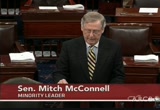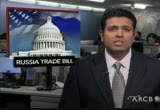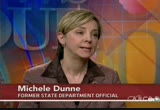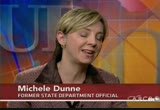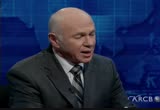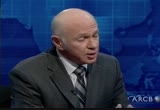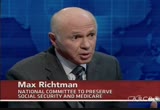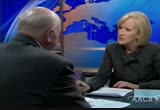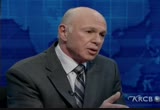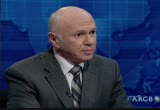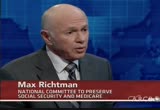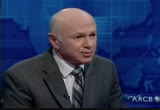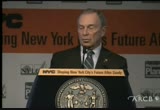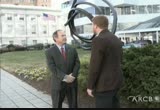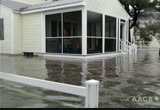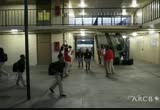tv PBS News Hour PBS December 6, 2012 5:30pm-6:30pm PST
5:31 pm
macneil/lehrer productions >> brown: with no compromise in sight for a deficit deal, president obama pressed his case at the home of a middle class family in virginia today, part of his pitch to extend tax cuts for all but the very wealthy. good evening, i'm jeffrey brown. >> woodruff: and i'm judy woodruff. on the "newshour" tonight, we update the state of the negotiations and examine the push to make changes to social security and medicare. >> brown: then, margaret warner looks at the political strife in egypt, after deadly clashes in the streets and resignations by top officials. >> woodruff: we have a battleground dispatch from a coastal city facing rising sea levels and the next big storm. >> if sandy were to come close r directly into norfolk i think we'd all be in big trouble. >> brown: we assess the latest diplomatic moves to end syria's war, as secretary of state hillary clinton meets with russia's foreign minister. >> woodruff: and ray suarez has the story of a program that aims to put students at low-achieving schools on a path to high school graduation.
5:32 pm
>> we're here to make things better. we're here to tutor kids. we're here to make sure that they stay on track. we are here to make sure that they graduate. we want to prepare them for high school. >> brown: that's all ahead on tonight's "newshour." major funding for the pbs newshour has been provided by: ♪ ♪ moving our economy for 160 years. bnsf, the engine that nnec us. and by the alfred p. sloan foundation. supporting science, technology, and improved economic performance and financial literacy in the 21st century.
5:33 pm
and with the ongoing support of these institutions and foundations. and... this program was made possible by the corporation for public broadcasting. and by contributions to your pbs station from viewers like you. thankou. >> woodruff: with 25 days left until the year-end fiscal cliff, and just 19 days until christmas, president obama warned lawmakers today not to add to the holiday pressures americans already feel, by letting the political stalemate drag on. but he also again insisted there would be no deal unless tax rates went up on the wealthy. >> the closer it gets to the brink, the more stressed we're going to be. >> woodruff: president obama made the short trip to northern
5:34 pm
virginia today to underline his plan to avert the fiscal cliff. at the home of what the white house called a typical middle class family, mr. obama said he's optimistic that agreement can be reached, but again drew a hard line for republicans in congress. >> everybody's is going to have to share in some sacrifice. but it starts with folks who are in the best position to sacrifice. who are in the best position to step up . just to be clear i'm not going to sign any package that somehow prevents the top rate from going up, the top 2% from going up. >> woodruff: the president phoned house speaker john boehner yesterday, their first direct talk in almost a week. but today white house spokesman jay carney wouldn't share details of the call. >> we believe it's in the interest of achieving an agreement not to do that. >> reporter: treasury secretary timothy geithner said yesterday
5:35 pm
the white house was absolutely willing to go over the cliff if republicans held firm in their opposition to raising rates on the wealthy. but it was the administration's other demand-- to give the president authority over the nation's debt ceiling that roiled tempers on capitol hill. senate minority leader mitch mcconnell tried yesterday to force a vote on the issue, assuming republicans would prevail. >> look, the only way we ever cut spending around here is by using the debate over the debt limit to do it. now the president wants to remove that spur to cut altogether. it gets in the way of his spending plans. i assure you, it's not going to happen. >> reporter: but when majority leader harry reid took him up on the offer today, mcconnell backed down.
5:36 pm
>> what we have here is a case i told everyone that we are willing to have that vote, up or down vote, and now the gop leader objects to his own idea. >> woodruff: meantime, republicans learned today the party was losing one of their most outspoken voices on fiscal issues. two-term south carolina senator jim demint announced that he will resign in january. to become the next president of the heritage foundation-- a conservative washington think tank. in a statement, demint said, a tea party favorite, demint had blasted the house republicans' proposal to raise rev earlier in the week. south carolina's other senator lindsey graham lamented the loss of his colleague and friend. >> he really did strongly and passionately advocate for his position and did it very effectively, jim made the republican party quite frankly
5:37 pm
look inward and do some self evaluation, conservatism is an asset not a liability. >> woodruff: the other side of capitol hill was largely quiet today, with the house not in session, and most members gone home for the weekend's recess. >> brown: still to come on the "newshour": egypt's political turmoil; trims to social programs to solve the fiscal crisis; sea level rise in a virginia city; diplomatic movement on syria and a path to high school graduation. but first, the other news of the day. here's hari sreenivasan. >> sreenivasan: the death toll from a typhoon in the southern philippines climbed to more than 370 today. nearly 400 others are still missing since the storm hit tuesday. rescue workers in the hardest- hit compostela valley province battled surging flood waters again today, to reach survivors. most of their homes were demolished, along with just about everything else. >> ( translated ): since i was born, this has never happened here. when i came back here yesterday, i cried because of what i saw.
5:38 pm
you can see our hills, everything is gone. 100% of the crops are gone. >> sreenivasan: the typhoon is now swirling over the south china sea. it's expected to break up by the weekend. washington state is now the first state in the nation where recreational use of marijuana, by adults, is legal. the new law was approved by voters last month, and took effect at midnight. in seattle, about 100 people marked the occasion by smoking joints beneath the city's iconic space needle. technically, doing that in public remains against the law. marijuana is still illegal under federal law. but the justice department has not said if it will try to block the washington state law or a similar statute in colorado. same-sex marriage also became legal in washington state today, and in maryland. gay and lesbian couples in both states began picking up marriage licenses. those in washington state have to wait three days to be married. same-sex ddings in maryland will begin on january first. maine will legalize the practice on december 29. the three states are the first to approve same-sex marriage by popular vote. in economic news, new jobless claims fell sharply last week,
5:39 pm
after a temporary spike in the wake of hurricane sandy. and on wall street, stocks managed modest gains today. the dow jones industrial average added 39 points to close at 1,374. the nasdaq rose 15 points to close at 2,989. the u.s. senate has overwhelmingly approved a bill normalizing trade relations with russia. but the measure also contained provisions to punish russian officials accused of human rights offenses-- move the russian government has denounced. the house passed the legislation last month. president obama has pledged to sign it into law. it was all smiles today for the duchess of cambridge, as she left a london hospital. the former kate middleton was discharged after being treated for severe morning sickness. the duchess emerged with her husband, prince william, three days after being admitted. the hospital stay prompted royal officials to announce her pregnancy to the public. those are some of the day's major stories. now, back to jeff. >> brown: and to egypt. within the last 24 hours the country has seen the worst violence since president mohamed mor was electedn june. seven people were killed and more than 600 hurt during
5:40 pm
overnight clashes in cairo outside the presidential palace. we have a report from jonathan rugman of "independent television news." >> reporter: last year, they ousted a dictator. last night, they turned against one another. religious and secular egyptians fighting outside the palace of their first freely-elected president. after riot police gave up keeping the two warring sides apart. seven people were killed and hundreds were injured. both sides were armed with clubs, but eyewitnesses said the first gunfire came from president morsi's supporters. the president's opponents let off fireworks. but they say they won't back down until the president gives up sweeping new powers or resigns. this morning, the army moved in. not to mount a military coup, but to defend a president they would once have jailed for his political views.
5:41 pm
the commander of these troops saidhese tanks were just to keep rival factions apart. but if mr. morsi can trigger a political crisis in less than six months, then his presidency may prove short-lived. last month, he was the hero of the hour. america's new point man in the middle east. brokering a ceasefire between israel and gaza. since then he's granted himself unlimited power. and rushed through a draft constitution branded by liberals and christians as a betrayal of egypt's transition to democracy. morsi's muslim brotherhood had 70 years in egypt's political wilderness to prepare for government. though his supporters point out that his religiously-worded constitution will easily pass in a referendum set for later this month. >> ( translated ): why are they always afraid of the ballot box? whenever there is an election or a referendum they're afraid of the ballot box. it is because they know the people are not on their side.
5:42 pm
>> reporter: tahrir square was far from full today. egypt's had its revolution and that, for many, will suffice. yet the president's opponents say another may now be required. >> ( translated ): we didn't have a revolution just to return to the era of mubarak and worse. >> ( translated ): mohamed morsi has divided the nation. we want him to fall. along with the muslim brotherhood because they are traitors. >> reporter: last night, muslim brotherhood offices were set on fire outside cairo. and crowds with these demands are now gathering again outside his palace. >> sreenivasan: three more officials announced their resignation in wake of the violence. late today, in a televised speech, president morsi called for a comprehensive and productive dialogue. but he also accused some of the opposition of serving the old mubarak regime. and he insisted a referendum on the constitution would go ahead on december 15. margaret warner takes the story from there.
5:43 pm
>> warner: for more on the clashes and the response by president morsi, i'm joined now by michele dunne. she previously served in the state department and the national security council staff. she's now the director of the rafik hariri center for the middle east at the atlantic council. welcome back. how serious a crisis is this for this new egyptian government and for president morsi himself? >> it's a pivotal moment in the history of egypt after this revolution we're seeing extreme polarization between islamists and non-islamist forces and between parts of the government that that contain people who were there during the mubarak regime. there are a number of senior judges. so there's a lot at stake centering on this debate over
5:44 pm
the constitution and whether it should go to a public vote. >> warner: the islamists and secularists have been at loggerheads for over a year. why has it hit such a -- at least it looks like a crisis point now, with this kind of violence between the two camps. >> there have been a couple things that have happened in the past couple weeks. with this november 22 decree president mopls did seize extraordinary powers. basically he's trying to prevent the judiciary from dissolving the constituent assembly that was drafting the constitution and so forth and he said the judiciary could not annul his decrees so he's put himself above the judiciary and he has legislative powers since the parliament was dissolved so all this power in the hands of one person then he's forcing ahead this constitution that is still controversial. a lot of people are unhappy with it. >> warner: you've known people, you've been in touch with people from the muslim brotherhood and
5:45 pm
people around president morsi since before the revolution and i think you met some of them who are here with washington. how did they explain him acting in the way that you just described which has led some to say he's as autocratic as mubarak? >> well, what their side of the story is is that the judiciary they believe was about to dissolve the constituent assembly and basically set the whole political transition back months so that they could not pass the new constitution, old new parliamentary elections and what they feel is that elements of the old mubarak regime are trying to force morsi's presidency to fail. and to keep the political transition from progressing and that morsi ha had to take extraordinary action to prevent that from happening. but the other side of the story is that what morsi is now doing is forcing a popular vote which undoubtedly would approve this
5:46 pm
draft constitution and then there will be parliamentary elections but it will be difficult to amend the constitution in the future. that takes two-thirds of the parliament and non-islamists know they're not going to have that. >> warner: how do you interpret his televised speech tonight? we don't have all the words, he read them in arabic but was he extending any olive branch by saying "let's have a dialogue starting saturday" or is he taking a hard line? >> i watched morsi's speech and he offered a very small crumb, i would say, to the opposition. he said that the part of the november 22 decree in which he basically gives himself any power necessary to protect the revolution has been misunderstood and he would be all right with canceling that part of it. and he invited them a dialogue with them -- with him. however the dialogue is to be on saturday which is when voting outside of egypt among expats would start and he insisted that voting has to go ahead on the
5:47 pm
referendum. i doubt that will be acceptable to the opposition. is. >> warner: which they haven't really said except one group. what should we look for next. protests are planned for tomorrow by the opposition, is that right? >> there will be more protests. we saw today the torching of the muslim brotherhood headquarters in cairo and i think unfortunately there's going to be more violence. now, it's possible there will also be more concessions. already, for example, the justice minister who's part of morsi's government hinted that opposition leaders, if they come to this dialogue perhaps they can discuss defering the constitutional referendum. so it may be that there will be more concessions from morsi's side to avert more violence. >> and briefly who has clout or power to shape these events? the u.s.? >> secretary of state clinton has said the right things about the need for dialogue and the
5:48 pm
need for a constitution that protects the rights of all egyptians and an inclusive process and so forth. now, morsi's advisors heard this but i think what's happening on the streets of ciro and the officials from members of the egyptian government probably speaks louder right now. >> warner: michele dunne, thanks so much. >> it was my pleasure, margaret. >> woodruff: now, to our continuing series of conversations about what's at stake in the battle over taxes, government spending and debt. last night, we heard from republican senator bob corker. tonight, we get a different perspective on the question of so-called entitlements. many lawmakers and economists have argued it's essential to make big changes to medicare and social secity. o tho ideas are rsing the eligibility age; means- testing for wealthy recipients; cuts in spending and benefits and a bigger role for private competition in health care.
5:49 pm
max richtman has been arguing against making many of these changes as part of this fight. he's the president of an advocacy group, the national committee to preserve social security and medicare. he joins us now. >> welcome. >> thank you for inviting me. >> first of all, why shouldn't social security and medicare be part of the entire group of government spending programs that arebeing looked at to get to deal with the deficits? >> well, before i answer that i was very interested in the way you characterized these programs as entitlements. so-called, you said, entitlements. and we think that a better term would be earned benefits. you know, i counted the letters in the word "entitlement." there are 11 letters. often people refer to entitlement as a four-letter word and it's a derogatory, derisive characterization. these are earned benefits. people pay for them while they'reworking, social security part "a" medicare, the hospital
5:50 pm
part. 25% of the premium for part "b." so i wish we would switch from entitlements to earned benefits, first of all. now answer your question, social security has not added a penny to the federal debt, to the deficits every year. it has a surplus. it has a surplus of $2.7 trillion. so why are we in such a rush to change a program that does not have -- is not bankrupt, has a surplus, has 22 years of solvency before it does have a serious problem and has not contributed to the federal debt? >> and we can talk about these programs separately. we know that social security is considered to be in sounder shape than is medicare which is viewed as potentially running out of funds in the next few years, whereas social security -- but let's take them one at a time. when it comes to social security
5:51 pm
you have the simpson-bowles deficit reduction commission saying that if you don't deal with these programs you just can't be serious about getting your arms around this country's huge debt and deficit crisis. >> well, i go back to where i started. this program didn't add to the debt, hasn't contributed to the debt. we're not saying -- we're not a group that has our heads in the sand and is committed to never doing anything. social security is a dynamic program. it has changed over time. it will continu tohange. but let's look at social security for its own sake. you know, the last time social security was addressed by the congress and the white house it was to improoufl the solvency of social security, not as a scapegoat, not as a bargaining chip for problems that were not created by the program. that's where we're coming from. >> woodruff: but you're not
5:52 pm
saying don't address it at any time, you're just saying don't address it now? >> i think it's a mistake to address it now. it gets caught up in debate that it shouldn't be part of and we're going to solve social security and medicare in the next two weeks? >> woodruff: let's talk about medicare again for a moment, the other large so-called entitlement program. we've heard a lot of conversation about raising the eligibility age. we know americans are living longer. why isn't that a reasonable solution? president obama himself has said that's something that should be considered. >> well, it's not true that -- as you know, not all americans are living longer. we might be able to do a program like this for a long time, but there are some jobs that are much harder to continue working and have health care benefits and have those available.
5:53 pm
raising the age for eligibility in medicare would be particularly hard on communities of color. these are people for the most part they tend to have poorer health conditions at an earlier age. they've accumulated less wealth to pay for health care out of their pockets between, let's say 65 and 67 because of lower lifetime earnings and they have a shorter life span. so we don't need to do that. we don't need to look at ree dus benefits-- whether by raising the age for that or means testing or charging seniors more. >> woodruff: let me ask you about means testing which would lower benefits to those at a higher level. we interviewed bob corker of tennessee. he said "i've been successful in business and have made a very good living. why should by getting benefits as large as someone who earns a lot less?
5:54 pm
>> well, you know, senator corker doesn't have to accept those benefits. i hear that all the time. "i don't need social security. i have my own resources." sometimes the people that say that to me are getting social security. you don't get social security automatically. you have to go down to the office of social security and apply i tell them "if you feel that strongly about it, you don't need it, there's a form on the social security web site that you can fill out and you won't get your benefits. >> pelley: so you're saying it can be done on an individual by individual basis? >> i think so. i think changing social security from an earned ben nate you pay for while you're working into a means-tested program, let's be frank, that turns it into welfare and welfare doesn't have a lot of support in this country. >> woodruff: finally, what about this concept that these are programs that, yes, americans have paid into them but they --
5:55 pm
every economist who's looked at them virtually talks about how they are not sustainable in the long term and that what has happened is that it was senior citizens, politically influential, have been able to stave off any trims in benefits or any changes but that ultimately will be harm to feel the next generation and the next general wligs are going to be expected to pay and get benefits that just won't be there. >> as i said, our position isn't -- we're not saying -- any changes off forever. we're saying there are ways to improve social security. there are benefits that need to be improved for women or people that -- communities of color. those benefits need to be improved. medicare, instead of looking at cutting benefits, charging seniors more for premiums, co-payments, deductibles, what about thinking about the gaps in medicare?
5:56 pm
it's a good program if there's no coverage for hearing aids, hearing aids batteries, dental care, dentures. these are real needs for seniors. so these programs can be adjusted by improveing the efficiencies of the programs but maybe bringing home some revenue not going back to the old mantra of let's cut, cut, cut. >> woodruff: we hear you and i know those are arguments you've bullpen making all over washington. max ritchman, thank you so much. >> thank you so much. >> woodruff: and we'll ave different perspectives in the coming days. online we have a report from our partners at kaiser health news on how the fiscal cliff could affect health care for the military and for medicare patients. >> brown: next, a potential crisis of a different kind, one that has new urgency after hurricane sandy and that also involves federal spending: rising sea levels.
5:57 pm
today, new york city mayor michael bloomberg announced a new long-term initiative to protect the city from future natural disasters. he called for rebuilding vulnerable coastal areas, but dismissed again the idea of constructing a large sea-gate across the harbor. >> we're not going to abandon the waterfront. we're not going to abandon the rockaways or coney island or staten island's south shore. but we can't just rebuild what was there and hope for the best. we have to build smarter and stronger and more sustainably. >> woodruff: 350 miles south. the city of norfolk, virginia, is another coastal city vulnerable to sea level rise and extreme storms. but its mayor has said parts of his city might not be livable in the future. our producer, mike melia, traveled to norfolk recently to look at how it has been struggling with flooding and preparing for the next big storm. he worked with member station whro to bring us this report.
5:58 pm
it's part of our series-- working with public media partners across the country-- that we call "battleground dispatches." >> reporter: when residents of this port city wake up, even if there wasn't a storm that night, they regularly find some streets flooded from high tides. it is a far cry from the storm surges brought by sandy further up the coast, but that super- storm, which hit the week before election day, brought to the surface the issue of rising sea levels, the vulnerability of coastal cities and what can be done to protect them. in national exit polls, 64% of voters said that president obama's response to the hurricane was a factor in their decision. >> what i will be doing in the next several months is having wide ranging conversations with scientists, engineers and elected officials to find out what more can we do. >> reporter: mr. obama might look to norfolk, where they have been having those conversations
5:59 pm
for years. >> as we get more high tides and tides seem to get higher and we get more of these storms and they seem to come with a little more fury we get more and more water in our city as the days go by, so we are taking it very seriously. we talk about it nearly monthly. and we are planning for it. >> reporter: mayor paul fraim, a democrat, has been leading the charge and was the first elected official in the country to say parts of his city might not be livable in 15 years. >> we are raising homes. we are raising roads. but we are also retreating very slowly from some of the shoreline so we don't spend money raising houses so that when the next storm comes through they will be damaged again. >> reporter: mr. obama won the battleground state of virginia 51% to 48% over mitt romney. his victory was helped by taking 56% of the vote in the states southeast tidewater region that is home to norfolk. here, where streets like this are frequently under water, som
6:00 pm
people are hoping the election means political debate about climate change may be over. >> in the last month, this neighborhood has flooded three times. >> reporter: skip stiles heads wetlands watch, a local environmental group that works throughout the state. he took us to another vulnerable area downtown. >> this is an old apartment building. it has been here since 1904. so the abstract notion that we have had a foot of sea level rise in last 100 years. you can mark it against this building. we had a nor'easter in 2006 that came about here, about where sandy came. if you think about it 100 years ago that would be a foot and a half down, it wouldn't even have touched this building. problem is 100 years going forward, if you go up three feet, in 100 years this middle of the road nor'easter is suddenly as high as the storm of record in 1933. >> reporter: the national oceanic and atmospheric administration finds norfolk is
6:01 pm
the second most vulnerable area its size to sea level rise in the country, right behind new orleans. norfolk is particularly prone to flooding because of its location-- flanked by the atlantic ocean, the chesapeake bay and the james river. it is also slowly sinking. the city is home to roughly 250,000 people, a major port and the world's largest naval base. it is of critical importance to our national security. nearly 45% of the city's economy is tied to defense spending. and in response to sea level rise, the navy has been replacing 14 piers at a cost of $35 million to $40 million apiece. >> sea level here is coming up for lots of reasons. there is no reason for it to go down. it just keeps coming up. >> reporter: larry atkinson heads the climate change and sea level rise institute at old dominion university. >> there is anecdotal evidence and there is real evidence that we have from the tide gauges we have. we can measure this. the science is simple. >> reporter: atkinson is part of a team of scientists the state of virginia has hired to study flooding.
6:02 pm
an early draft of the bill in the state assembly that funded the study drew criticism from some conservatives. the virginia tea party described the study on its website as: "more wasted tax dollars for more ridiculous studies designed to separate us from our money and control all land and water use." the final bill avoided the phrases sea level rise and climate change and won overwhelming bipartisan support this year. >> some people have tried to spin it into a political issue because we changed the wording from sea level rise to flooding. >> reporter: republican state delegate chris stolle changed the language in the legislation. he argues the problem is real, no matter what you call it. >> we wanted this study not to get caught up in that discussion of sea level rise. what we want to know is what are we going to do for the folks here in norfolk, the tidewater, and virginia beach to stop the water from coming in their doors. >> reporter: to do that, norfolk is taking a number of steps to protect its residents and keep them dry. but when a big storm does hit, the greatest challenge this city faces is getting its vulnerable
6:03 pm
residents to safety in time. >> it would take at least 36 hours to get the folks we identify in the low lying areas who need to get out, to get out. >> reporter: jim redick directs norfolk's office of emergency management. >> and we know it is a challenge for folks to heed the warning. chances are it will be a bright sunny day and they don't want to leave. >> reporter: bob parsons lives in one of the most vulnerable areas of the city. he's kept track with pictures of the many times water has lapped up to his door, as it did with sandy, even though that storm landed much further north. >> if sandy were to come close or directly into norfolk i think we'd all be in big trouble. most of the city would be underwater. there is no way out of here unless you leave days and days ahead of the storm. >> reporter: but he's the type of resident that worries emergency manager redick most. >> personally, i am not inclined to leave until someone in a boat pulls up to the front door and says get in.
6:04 pm
otherwise, we will stay on the second floor and hope we stay above it. >> reporter: from the markers he keeps on his garage door of water lines in the past, when a big storm hits, staying above the surge might be difficult. >> the high water marks are not a good selling point for the property, but i like the idea and record what we have here. it started in 2003 for isabel. >> reporter: because norfolk is nearly surrounded by water, the main ways out of the area in an emergency funnel to a set of just a few tunnels and bridges. >> our traffic is horrific in this area so when you compound the traffic and the flooding at certain times of the year during storms it really is the perfect storm. >> reporter: dr. terry whibley is a physician in town and on the city council. >> we have so much to do and so many needs, that we are
6:05 pm
considered one of the forerunners is the ultimate irony, but we have, i think, taken good measure to try and figure out what is going to be our best approach, to seek help, to seek studies and try to come up with a measured solution. >> reporter: four years ago, the city hired the dutch engineering firm fugro to study the threats to the city. >> the focus of our efforts and study and evaluation is coastal flooding. >> reporter: kevin smith is fugros chief engineer on the project. >> we have evaluated up to 100 year storm event. >> reporter: what would be the impact on the city? >> the impact is significant. >> reporter: they have recommended building sea walls and elevating homes. the price tag would be a little more than $1 billion. for that, the city will need help from the state and federal government. the election, following sandy, brought a renewed focus on bipartisanship and the need to invest in storm protection. but mayor fraim will be competing with other coastal
6:06 pm
areas to secure much needed federal dollars. >> there is a hugenvestment by the nation for its defense here and we are the only home for nuclear aircraft carriers on the entire atlantic coast. we are worth preserving for sure. it is something that is happening to us. we sense it. we know it. we have studied it. and now we are trying to prepare for it. >> reporter: with the cost of repairing the damage from sandy now totaling more than $50 billion for new york and new jersey alone, cities like norfolk are working hard to invest to protect themselves before the next big storm hits. >> woodruff: by the end of the week, the white house is expecteto ask congress for an additional $50 billion to $60 billion to cover the cost of repairs from sandy's devastation. and online, you can watch our upcoming story about shellfish threatened by ocean waters that are increasingly warmer and more acidic. that's on our "coping with climate change" page.
6:07 pm
>> brown: and we return now to the conflict in syria. inside the country, there was more heavy fighting today. outside, there were more signs. >> events on the ground are accelerating and we, we see that in many different ways. >> brown: the civil war in syria was never far away for the ministers at today's european security conference in ireland. in another sign that russian support for syrian president bashar al-assad may be changing, secretary of state hillary clinton held surprise talks with russian foreign minister sergei lavrov and u.n. envoy lakdar brahimi who spoke to the press. >> we haven't taken any sensational decisions but i think we have agreed that the situation is bad and we have agreed that we must continue to work together to see how we can find creative ways of bringing this problem under control and hopefully starting to solve it.
6:08 pm
>> brown: all of this, amid rising fears that the syrian president might use chemical weapons against the rebels. in washington, defense secretary leon panetta joined a chorus of u.s. warnings. >> the intelligence that we have raises serious concerns that this is being considered. >> reporter: those concerns were echoed on capitol hil >> if syrian tv is catching this news conference, there's been a tidal shift here to where military force will be used to prevent those chemical weapons from ever seeing the light of day. >> brown: but syria's deputy foreign minister, speaking on lebanese t.v., charged that if anyone is planning to use chemical warfare, it's the west. >> ( translated ): we have strong fear of the existence of a conspiracy to use the weapons; by the united states and some european states, which might have supplied such weapons to terrorist organizations in syria, in order to claim later that syria is the one that used these weapons. >> reporter: meanwhile, germany's cabinet endorsed a plan to deploy patriot missiles along turkey's border with syria.
6:09 pm
nato says the missiles will be used for defensive purposes, but in beijing today, the government of china objected. >> ( translated ): we have noticed the situation. china has always insisted on political resolution of tensions in syria issue through dialogue and consultation. highlighting military factors and strengthening military existence are not conducive to the resolution of conflicts and disputes, and inconducive to the >> brown: in syria today, heavy fighting continued around damascus, where government forces are trying to beat back encroaching rebel fighters. >> brown: with me now is fred hof, who's had an up-close look at both the on-the-ground and diplomatic efforts, serving until recently as secretary of state clinton's special advisor for transition in syria. he stepped down in september and is now a senior fellow at the atlantic council. mr. hof, welcome. looking at that meeting in dublin today, do you sense movement in the diplomatic effort? especially that would include russia. >> jeff, i think meeting is potentially important, but at
6:10 pm
this point i would probably be prudent not to read too much into it. lakhdar brahimi, as you know, replaced kofi annan as the united nations and arab league special envoy last summer when mr. annan left. he is trying desperately to try to put together some kind of a diplomatic game plan to put an end to the civil war in syria and to inspire a complete political transition. so this was his initiative to try to bring these two senior officials together. >> pelley: if we're at a crucial moment here, how much has the u.s. actively engage with opposition groups in syria and should it they be more engaged? >> the u.s. is actively engaged with the syrian opposition both inside syria or at least with contacts with group inside syria and with the external pop sigs
6:11 pm
as well. the united states played an important role in encouraging the opposition to form a new national coalition which does appear indeed to be quite representative of the opposition. >> brown: how much are we able to control the flow of arms and supplies inside? are we able to pick the good guys and the bad guys? the potential winners and losers? how much do we play a role there? >> i suspect, jeff, that we know a lot more now than we would have known 90 days, 180 days or a year ago. the amount of non-lethal supplies that are going into syria is quite substantial to the best of my knowledge the united states is still not in the business of sending weaponry into syria. >> brown: your title is
6:12 pm
literally looking at transition whenever it comes. what kind of influence do you think the u.s. can hope to have based on everything that's happened up to this point when and if we do get to a post-assad syria? >> i think the united states and its allies can have a great deal of influence on the shape syria takes post-assad. i know from my own experience there has been an intensive amount of planning within the state department and other agencies of the executive branch across seven or eight major sectors, plans that include cooperation with allies in working to restore the syrian ecomy d help syrians get back on their feet. this has been a very, very serious effort. not much noted in the press but it's ongoing. >> brown: and it is widespread and looking at all facets of syria? >> it's looking at all facets of
6:13 pm
syria. >> brown: give us an example of what kinds of things we might have learned from past that you think we might apply in syria? >> i think one of the things we certainly learn from past experiences is that it's going to be very important to the extent possible to preserve as much of the state and the existing government as we can. now, when i say "existing government" i'm not talking about ret regime. >> brown: you're not talking about assad and those people. >> the regime we're talking about assad, his extended family and the circle of enablers around him. i think it's inevitable that they're going to have to leave in order for a stable settlement to take place. >> brown: do you think if and when assad falls, how prepared is the opposition from what you see now to manage a transition like that? >you know, the opposition is still very much a work in progress on that score.
6:14 pm
it's hard work. this is a political culture that has been repressed for the better part of a half century. it's a political culture that's been, in effect, in a coma. it's not easy for opposition people to bring to the table with one another the requisite levels of trust and confidence to cooperate on a transition scheme. remarkable progress is ting place but there's more to be done. >> brown: in our last minute here i noted it was a full year ago, last december, you told a congressional hearing that president assad was a "dead man walking." it's a year later. what's your assessment? how long does he -- >> well, he's still walking. as a matter of fact i didn't permize it. i said at the time that the regime is a dead man walking. there is no question that this regime is coming to an end. there's no question that bashar al-assad's rule is coming to an end.
6:15 pm
when factly that's going to happen it's impossible to say but sooner rather than later is important because the more time he has the greater the risk that this country will be destroyed. >> brown: fred hof is former special advisor to secretary of state hillary clinton. >> thank you very much. it's been my pleasure, thanks, jeff. >> woodruff: finally tonight, finding ways to boost high school graduation rates. many failing schools and so- called dropout factories in the united states have adopted turnaround models to improve test scores and achievement. in some places that's meant dismissing the principal and half the teaching staff. but one louisiana middle school is among about 40 across the country trying a different approach. ray suarez reports for our american graduate project. >> reporter: at broadmoor middle school in baton rouge, louisiana, early mornings have the feel of a pep rally.
6:16 pm
all 525 students are greeted every school day by a team of young adults from the national service organization city year. the non-profit works like an urban peace corps. it requires recruits-- many of whom are recent college graduates-- to work for ten months in some of the nations highest-need public schools in an effort to reduce the dropout rate. today's cheering and upbeat attitude is in contrast to how the school was when principal denise charbonnet arrived in 2009. >> the first year i came i almost turned and walked out the door. the discipline was a real issue here. we had over 50% suspension rate. >> reporter: on top of behavior issues, charbonnet also inherited a school where one in four of the students were failing and the district was seeing a spike in homelessness. broadmoor middle school is made
6:17 pm
up of mostly minority students and 95% of them are eligible for free or reduced lunch, meaning the kids come from low-income families that qualify for federal assistance. but despite these challenges, charbonnet says her school has largely been able to turn things around in the last three years. >> we have lowered our suspension rate from 50% to 15% which is below the national average. we have lowered the failure rate from about 20%-25% to 7%. and we've improved attendance in each and every grade level. >> reporter: it's an unlikely success story that charbonnet says began when a program called "diplomas now" came to broadmoor. diplomas now identifies at-risk students long before they could ever drop out of high school and then provides a set of intervention and support guidelines to raise achievement. the idea came from one of the
6:18 pm
nation's leading experts on dropout prevention-- robert balfanz of johns hopkins university. balfanz has spent years developing a data-driven model that flags early warning indicators to target students who show signs of falling behind in subjects like math and english. he says that two pivotal years determine whether or not a student will be academically successful. >> our focal point is always starting with sixth and ninth grade because the data shows if you can make the transition to middle school and the transition to high school and really get from sixth to tenth grade on time and on track your odds of graduating go from maybe one in four to three in four. it's a really big shift. >> reporter: in 2009, with the help of $30 million in federal stimulus funds, balfanz was able to implement his research in 44 schools across the u.s. one of which was broadmoor in east baton rouge.
6:19 pm
at the heart of balfanz's he admits that's a high number at first, but that it's well worth it in the long run. >> the cost to society of a dropout is staggering compared to the investment it actually costs to keep many of these kids in school. the number of youth 18 to 24 who are dropped out of high school that are neither in the labor market nor in any kind of training is in many cities over 50% to 60% i mean true depression levels statistics and imagine if you are 24 years old, don't have a high school diploma, and now don't have a work history, are you ever going to actually be employable? the odds are quite likely not. >> reporter: denise charbonnet says that balfanz's model was
6:20 pm
it focuses on attendance, behavior and course performance with the first goal being simply to get students to show up on time for class every day. >> not surprising kids that don't attend get in trouble and fail their courses, drop out and we found that kids were signaling early and often but schools weren't designed to pay attention to it and if they did pay attention they didn't have the resources to respond. >> reporter: balfanz says that many of the schools in his model needed additional resources as quickly as possible. and his research showed that it was critical for students to have relationships with adults inside the school that shifted constantly from nagging to nurturing. balfanz says that city year, which already had a national presence, was a natural partner for diplomas now. >> by having this corps member who is a near peer, who has just graduated college, knows your music is seen as being the captain to the whole classroom, getting attention from that person is seemed like, "wow, i'm getting attention from the cool person. so that sort of flips that dynamic that getting extra attention is now good not bad. >> reporter: and that dynamic is
6:21 pm
on display with keithrick junius jr.-- a seventh grader at broadmoor. teachers say that keithrick had some behavior issues last year but that he is making great strides, in part because of his relationship with sara ross, who keithrick describes as being his older sister at school. >> she helped me with my school work, she helped me with school problems and all that type of stuff-- like say if for instance if i get put out of class she'll walk me around the school and sit down and well talk and she'll bring me back to class and i'll get back and do my work. >> reporter: ross, a baton rouge native, is in her second year at broadmoor, helping to lead the corps members here onheir mission. >> we're here to tur kids. 're here to make sure that they stay on track. we are here to make sure that they graduate. we want to prepare them for high school. >> reporter: but diplomas now also works to address more serious student problems that may go beyond the scope of what
6:22 pm
either school officials or city year can handle. >> those things that might be affecting their physical or mental health, such as suicidal ideas, loss of a parent or a loved one, incarceration of a parent, mental health diagnosis, physical health diagnosis all those things so it runs the >> reporter: gensler also takes >> reporter: patrick gensler from communities in schools, also a diplomas now partner, says that he sees more than 50 students at broadmoor who are having issues that keep them out of the classroom. gensler also takes part in the regular required meetings involving all of the partners: school administrators, teachers, city year corps members, and e johns hkins diplomas now team based in baton rouge. each student showing warning signs in attendance, behavior or course performance is discussed at length. >> why do you think this
6:23 pm
students behavior is sliding. >> reporter: a plan is then agreed upon for the best course of action. incentives and encouragement are often used, as are calls home to a parent for any student who doesn't show up for class. eighth grade science teacher shelis jones says the meetings have been instrumental in changing the culture at broadmoor. >> when we are the we are discussing individual students who may have some signs that need to be addressed and we designate who is going to focus on that and it breaks the job down it makes it a little easier it's not one big load on the administration, one load on the teacher, it's divvied up and i like that. >> reporter: and the program also seems to work for students like keithrick, who says he wants to one day become an architect so that he can build homes for the homeless. first though, he is narrowing down his options for what he wants to do after high school graduation. >> i'm thinking going to a probably l.s.u. if i'm still in
6:24 pm
louisiana or julliard the school of arts and music and all this stuff. did i say that right? >> reporter: denise charbonnet says that balfanz's model was immediately embraced by the school because it didn't call for a full-scale turnaround. >> johns hopkins came and what i really, really liked about them is that they didn't come in and try to say that we needed to do everything differently. they came to say what can we do to enhance what u are doin here. how can we make it better? >> we often have this vision that it's because the adults weren't succeeding if we change the adults, find the right person to blame maybe it's the principal, maybe it's the teachers, change them, maybe it's the community close the school, change them well be okay. and not recognizing by and large people are really trying to do a good job and they are just overwhelmed and over matched. >> reporter: robert balfanz says he is aiming to implement
6:25 pm
diplomas now in 20 additional schools over the course of the next two years. >> brown: an update: principal denise charbonnet has left broadmoor middle school since we filmed this story. and we have more on "diplomas now" on our website, including why mastering the middle grades is an important component of the program. "american graduate" is a public media initiative funded by the corporation for public broadcasting. >> woodruff: again, the major developments of the day: president obama visited a middle class family in virginia to press his case for tax hikes on the well-off. but there was no outward sign of movement toward a fiscal cliff agreement. and egypt's president morsi insisted he would not let protesters overthrow his regime, after a night of violence that saw seven killed and hundreds injured. online we mark the passing of a great modernist architect. hari sreenivasan tells us more. >> sreenivasan: brazilian oscar
6:26 pm
niemeyer's buildings had a simple yet bold style. his designs left a mark on cities and architects worldwide. he died yesterday at the age of 104. we have a slideshow of his works in the capitol, brasilia and elsewhere. plus, paul solman takes viewers' questions about the pitfalls of investing in bonds. he explains in making sense. site newshour.pbs.org. >> brown: and that's the newshour for tonight. i'm jeffrey brown. >> woodruff: and i'm judy woodruff. we'll see you online. and again here tomorrow evening with mark shields and david brooks among others. thank you and good night. major funding for the pbs newshour has been provided by: and with the ongoing support of these institutions and foundations. and... this program was made possible by the corporation for public broadcasting.
6:27 pm
200 Views
IN COLLECTIONS
KRCB (PBS) Television Archive
Television Archive  Television Archive News Search Service
Television Archive News Search Service 
Uploaded by TV Archive on

 Live Music Archive
Live Music Archive Librivox Free Audio
Librivox Free Audio Metropolitan Museum
Metropolitan Museum Cleveland Museum of Art
Cleveland Museum of Art Internet Arcade
Internet Arcade Console Living Room
Console Living Room Books to Borrow
Books to Borrow Open Library
Open Library TV News
TV News Understanding 9/11
Understanding 9/11




